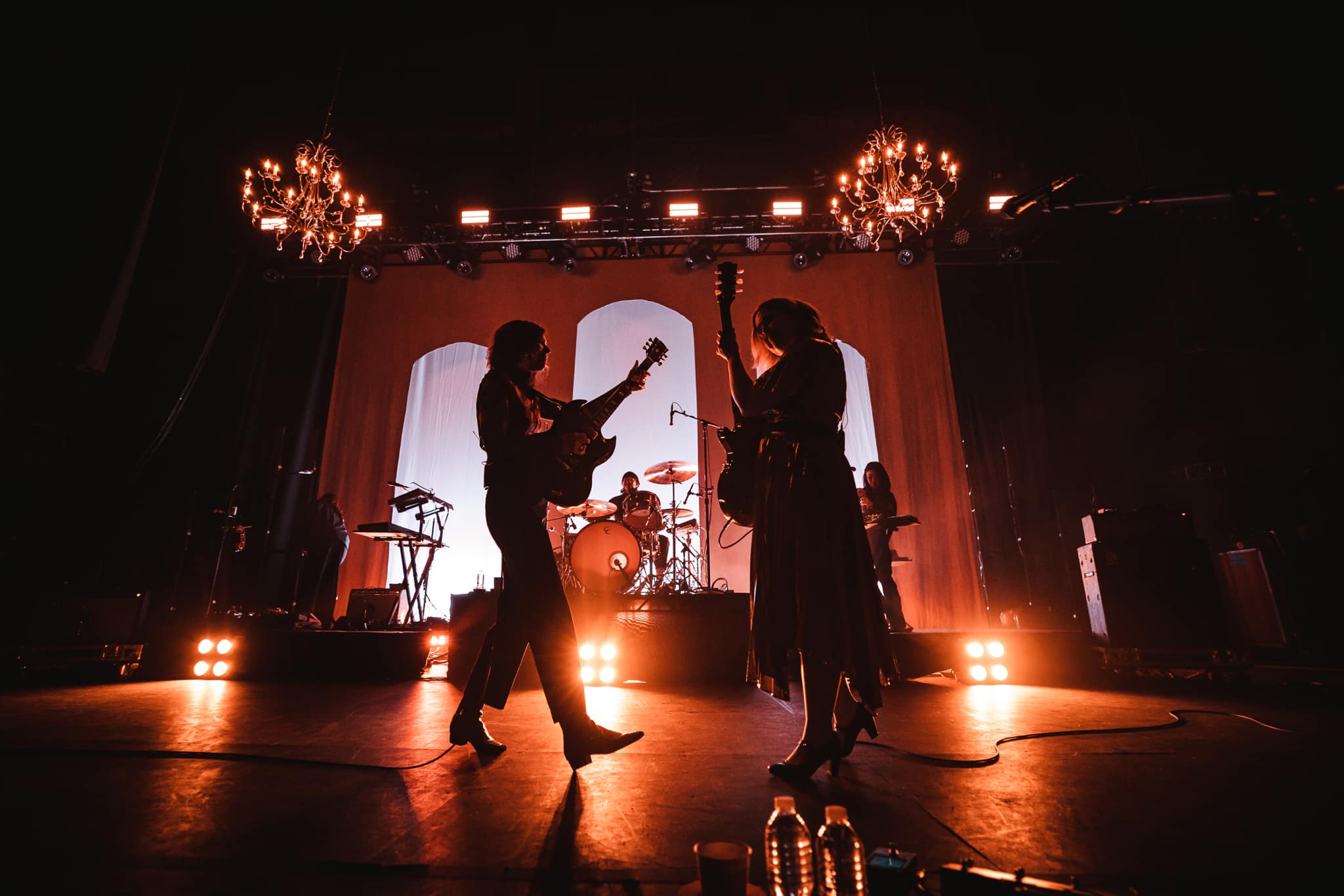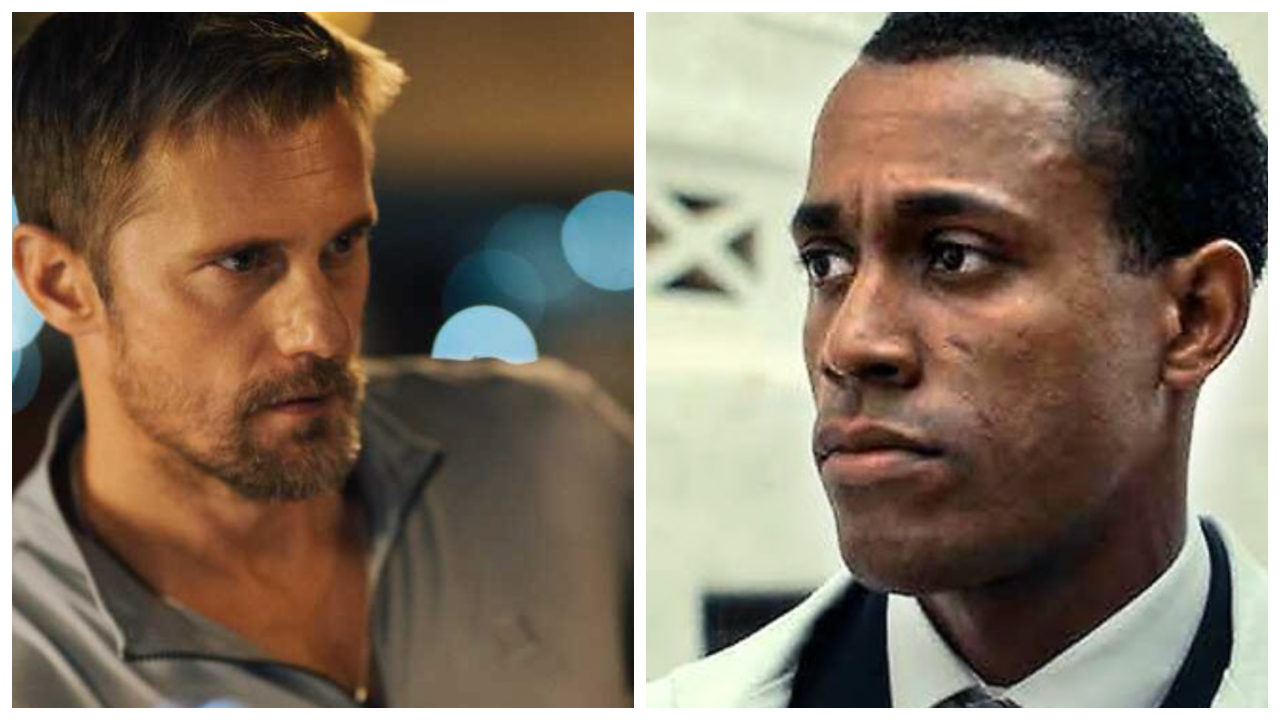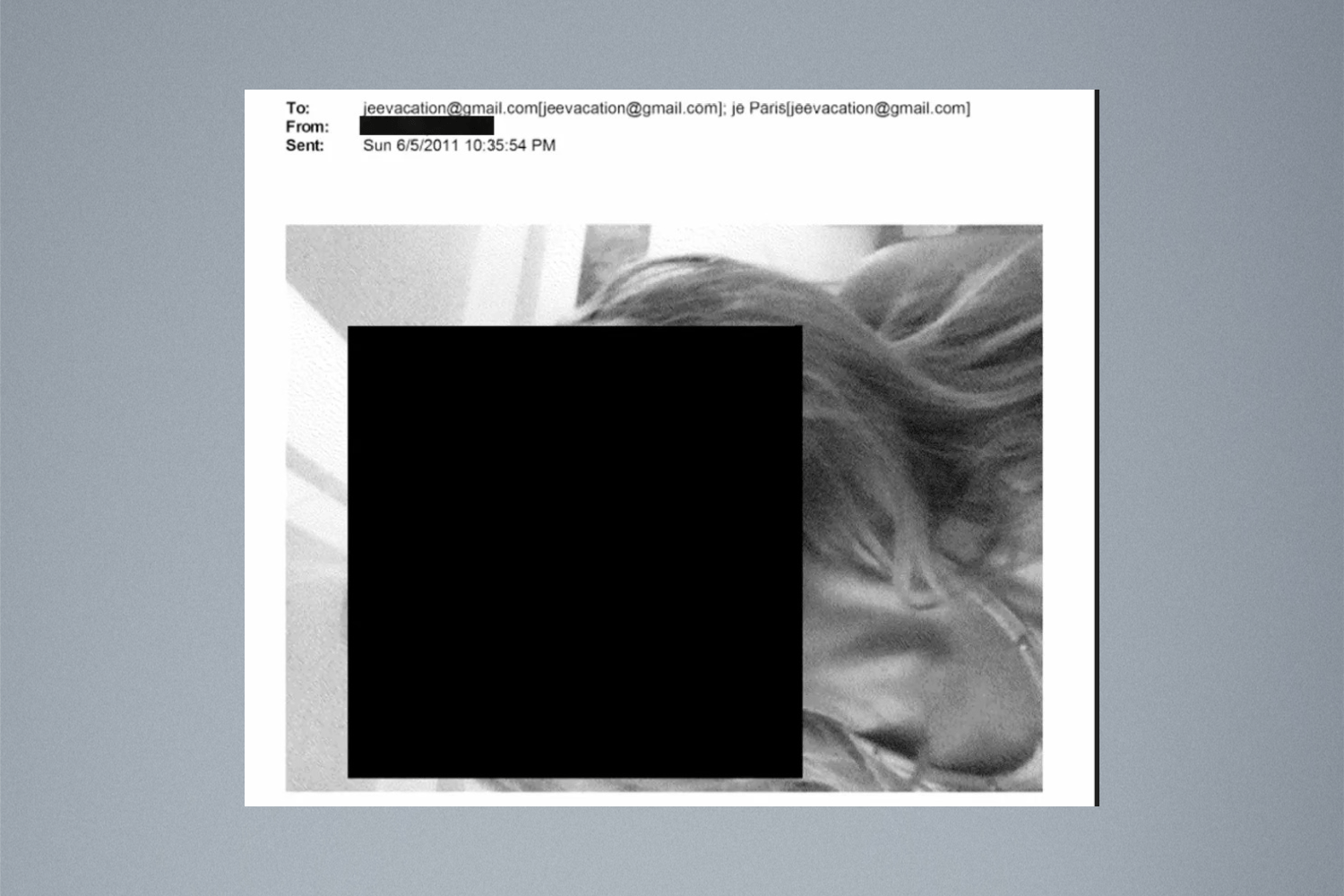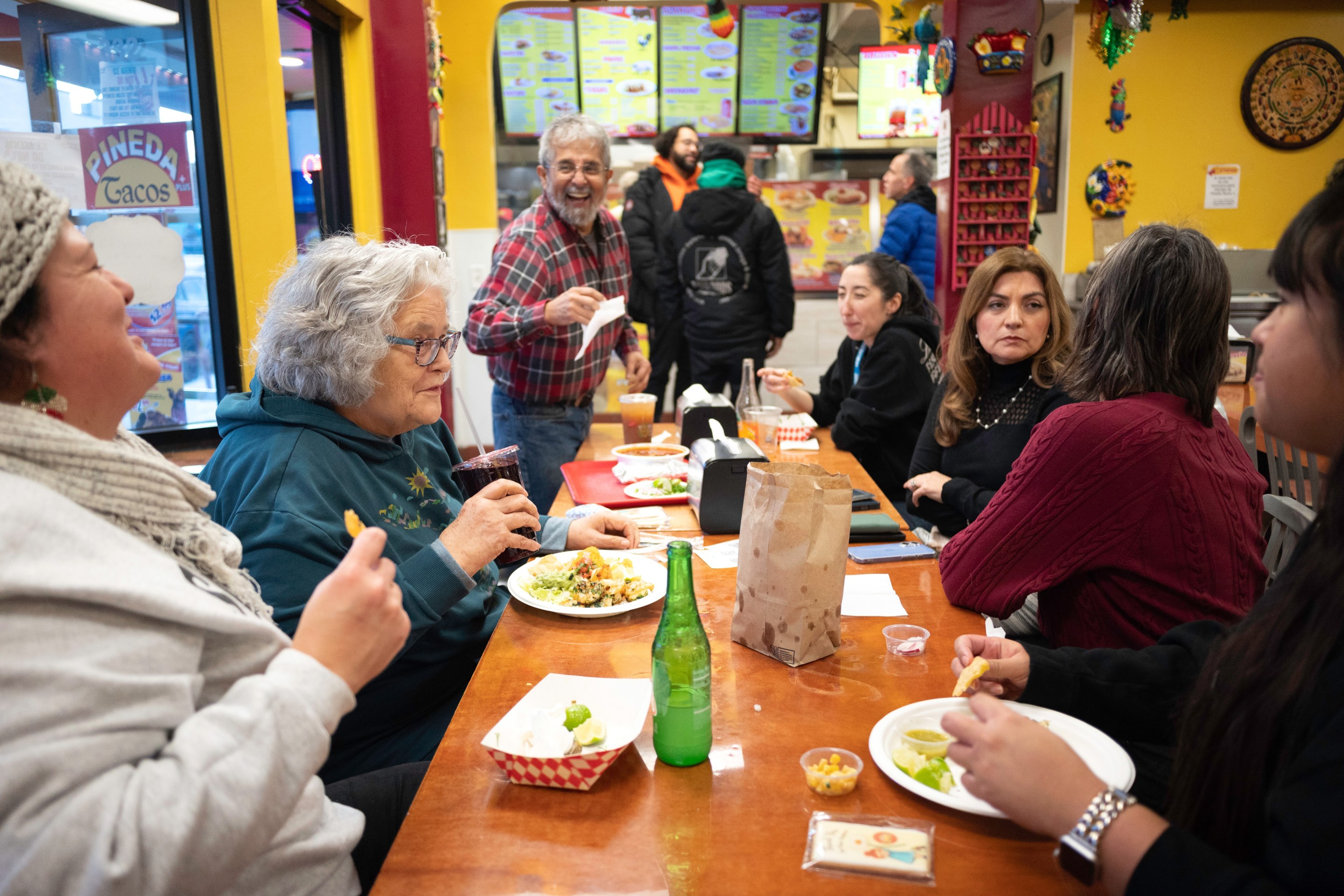I’d never been called “tepid” quite so gently in all my life. Granted, Carrie Brownstein hadn’t directed her comment at me specifically; you might even say that I (notebook, pen, working, etc.) had something of an excuse for not exactly kickin’ up my heels, more so than the many paying customers nodding in subdued approbation for Sleater-Kinney at St. Paul's Palace Theatre on Saturday night.
Not that any of them—any of us—had some obligation to go crazy out there, as the singer/guitarist acknowledged even as she noted what she more euphemistically called our “shyness.” When she thanked us “for bringing whatever version of yourself here that you could tonight,” it came off as a genuine (if a tinge Portlandic) attempt to meet a reserved Minnesota audience where they stood.
Brownstein wasn’t lecturing, or at least not trying to. She asked to keep the house lights up, four-fifths of the way through the band’s set, after “The Fox,” a showcase for her post-arena-rock shredding and fellow singer/guitarist Corin Tucker’s powerhouse voice. This felt like a musician reaching across the proscenium separating star from fan, hoping for a connection more human than entertainer and entertained, the sort of bond that the punk and riot grrrl scenes that had nurtured Sleater-Kinney always warned would fray in rooms this big.
During this pause, Brownstein also talked about life, and death, and about how the latter can interrupt the former with surprising suddenness. Her mother and stepfather died in a car crash when the band began work on their latest album, Little Rope—she didn’t mention it but anyone who’d read a word about the new record knew this. “That’s why I stand up here and dance around even if no one else is dancing,” she said, referring to how she shimmies onstage, not as if putting on a show but as if practicing to be a rock star in her bedroom mirror, even if her moves sometimes felt less joyful than willful tonight. And with that, she and Tucker went crashing into “All Hands on the Bad One.”
The No. 1 rule of concert reviewing (unless “go to the show” counts) is “Review the show, not the audience.” But when the audience (which, don’t get me wrong, seemed made up of perfectly lovely people) becomes the pointed subject of stage banter, then it’s part of the show. Maybe, as my pal Liz suggested, everyone was preoccupied with the coming snow. (Brownstein, a lifelong resident of the temperate Pacific Northwest, also mentioned the weather, saying she heard it’s always like this in March and joking drily, “That’s nice for you.”) I’ve also heard suggestions that our newly legalized THC drinks might lead fans (especially those over 40, as most of us were) to enjoy music in a more stationary way.
Brownstein had less directly referenced the crowd’s mood earlier in the set, after an oldie, “Get Up,” from 1999’s The Hot Rock, failed to get us moving. “Seems like some of you don’t know it,” she said. “Well, it was from last century.” Of course, so were most of us.
I’ve seen Sleater-Kinney live five times—not that often over 25 years, really. The first time was in 1999, after The Hot Rock, in a First Avenue Mainroom I’m pretty sure wasn’t sold out because kids were sitting on the floor between sets. I’d missed their formative small-room years even though I was a fan since ’96, and was so knocked out Brownstein’s stage presence and feral screams in her pre-S-K band Excuse 17 that I drunkenly went over to praise her after a Seattle show that Setlist.com tells me happened in May 1994. (“Watchmaker,” a broadside directed at some mansplainer long before that was term, is still a fave.)
The best of the that truly great bunch were the two shows I caught in 2006 following the release of The Woods—a kickoff at The Mercury in New York City (for which I wrote probably the most effusive lede of my career, which I stand by even if it’s a little silly, because it’s honest to how giddy Sleater-Kinney could make the soberest of mencrits feel) and a July night where Philly’s Starlight Ballroom was so humid with sweat I can still feel my fingertips pruning. This was their last tour before an eight-year hiatus lots of us never expected to end. Brownstein had really begun stretching out as a guitar hero and Tucker was howling with finely controlled abandon, the sort of paradoxical description Sleater-Kinney cries out for, as is this: Drummer Janet Weiss pounded like a math-rock John Bonham.
The “worst”? That was probably their excellent set at First Ave in 2015, on their comeback tour, about which I said “More than once.. you might possibly have convinced me that I was not watching the greatest rock band of the past 20 years.” Pretty faint damnation, eh? Let’s be honest: That show fuckin’ rocked. Or maybe it was the fifth-and-a-half time I saw them, two summers ago, when I stopped to catch part of a Rock the Garden set that I’d maybe subconsciously been avoiding, worried that I’d be disappointed. This was part of their first tour since Weiss left the band, and I liked what I heard but I’d paid less attention than I might. Again, maybe that subconscious at work, or the heat that drove me indoors.
And Saturday night? Well…
An electronic throb and ambient guitar fuzz filled a dimly red-lit Palace stage, and the duo made for two easily recognizable silhouettes once they entered, Tucker in a puff-shouldered dress and Brownstein lean in bell-bottoms, her shoulders pointy as a Romulan’s. “Hell” is the lead track on Little Rope and also their show opener; simmering verses where Tucker mused on the nature of the title concept—”Hell is desperation/And a young man with a gun,” for instance—gave way to blast-furnace choruses of synth whirrs, cymbal bashes, and chafed guitar. “You ask why/Like there’s no tomorrow,” Tucker wailed, her vibrato thrumming as the lights flashed appropriately crimson in time with the beat.
“Wail” is just an approximate word, as are most of the verbs that come within a mile of capturing Tucker’s singing. Bellow, howl, moan—all carry negative connotations, a reminder that sexism is baked into how our language hears a loud female voice. Her singing is more like a physical action like, say, an intense, sudden grab of the shoulders. In contrast, Brownstein’s Richard-Hell-as-Buddy-Holly yelp is acerbic and shaded with irony, much as her staccato guitar lines can be. As she copped to being “Needlessly Wild,” those Gang of Four guitar scrapes she long ago made her own abraded the music’s polished surface. Like many of her songs on Little Rope, this one doesn’t so much express grief as vent her frustration at its collateral effects. Few songwriters have ever been so tough on themselves for feeling sad as Brownstein has this time out.
Most of the show was given over to the new album—the band played nine of its 10 songs, from which phrases emerged and stuck with me in that resonant Sleater-Kinney way. Many felt more like warnings than exhortations: “The thing you fear the most will hunt you down,” “Dress yourself in clothes you love, for a world you hate,” “Don't hang around, I'm a real letdown,” “I’m hanging on but I can’t feel your love for me.” Hardly words of inspiration, spelled out like that.
But go-get-’em platitudes have never been Sleater-Kinney’s style. If hell is desperation, Sleater-Kinney have made a heaven of that, turning brokenness, need, and vulnerability into provocations, a dare to meet them at their emotional pitch that’s always been exhilarating. What’s always made them aspirational is their refusal to accept anything but total commitment, lyrically or musically.
If “Get Up” didn’t get us up, the tracks from 1998’s Dig Me Out dug us out. “One More Hour” remains a masterpiece of their early style, with guitars fitting into each other like cogs in some elaborate machine and voices that overlap like an internal conversation. And “Dance Party ’97” was reinvigorated, paradoxically, by slowing it down. Brownstein said they’d gotten the idea from Low, whose music she called "both earthly and otherworldly, full of grace and truly transformative”; the Duluth band had reimagined the song for a 2018 S-K tribute. Underscoring the night’s tone of grief, she said of Alan Sparhawk and the late Mimi Parker: “We send our love to Alan, and we miss Mimi with all our hearts.”
The more recent material from the band’s post-reunion career (No Cities to Love and The Center Won’t Hold) held up well. But curiously, they performed nothing from Little Rope’s immediate predecessor, Path of Wellness, which I hope doesn’t mean they forswear that 2021 album, their first after Weiss left the group. It reinvented their sound in ways that the new album retreats from slightly, and that their live show hasn’t quite adjusted to. So, OK, yes, let’s talk about Janet.
Weiss wasn’t the band’s first drummer—Tucker and Brownstein recorded two albums without her—but her playing would define Sleater-Kinney’s sound, particularly live, as surely as Brownstein’s prickly playing and Tucker’s force-10 vocals. She left in 2019 and they’ll never sound the same.
And if she hadn’t left in 2019 they’d still have never sounded the same, just as it’ll never be 1998 or even 2015 again, and also because this band has never accepted stasis as the goal. What I once described (and often recall) as “those onstage moments when the power they generate seems to catch them unawares” aren’t coming back any more than is my ability to work a full day on four hours of sleep. And yet, all that matters is what the band is capable of today.
Live, Sleater-Kinney is a five piece now, not counting the mysterious male auxiliary guitarist who—twice that I noticed—crept in from the shadows stage left. Toko Yasuda and Teeny Lieberson add texture and fullness on keyboards, guitar, and percussion without always feeling integral to the performance. Angie Boylan is a capable drummer who understands how to play the old stuff without resorting to strict mimicry.
But this is inescapably not a band—it’s Tucker and Brownstein with supporting players. Maybe that shouldn’t matter, but the distinction is as much musical as it is intellectual or psychological or ideological or whatever you want to call it. These musicians rock differently; ideally, the presence of a backing band frees Tucker and Brownstein to push themselves further, but in actuality the slackening of tension has dulled the interplay that once drove them to their full capabilities.
Tucker seemed tentative around the high notes, and Sleater-Kinney cannot be tentative. She hit them surely but she seemed to ease her way into them, and they lacked the confident vibrato of her other singing. A tech snafu might be partly to blame: During the encore, after a false start to “Good Things,” she complained good-naturedly about her earpiece, saying, “There’s either a dance club happening in my head or I’m having a psychotic break.”
Still, it’s a tendency I’d noticed (and mentioned) nine years earlier as well. Some of the oldies, like “One Beat,” a boast of raw power that relies on a full wattage Tucker for its explosive effect, didn’t fully detonate. But when she entered the audience to belt set-closer “Untidy Creature,” the final track on Little Rope, and maybe the closest Sleater-Kinney will ever come to a piano power ballad, her singing wrung everything from the complex lyric, which strains to defy an internalized self-loathing it can’t help but express.
For the encore, the duo took it way back to 1996, with the ferocious Tucker showcase “Good Things,” about how they always go away; she conveyed both the indignation of a 23-year-old discovering this for the first time and the self-awareness of a 51-year-old who’s learned just how many good things there are to lose. The new album’s rousing “Say It Like You Mean It” rammed into the irrepressible “Dig Me Out,” then skidded into “Entertain,” a jab at those who settle for doing only that. This felt the way an encore should, with a band leaving it all out on the stage and the crowd’s energy maybe even ratcheting up a bit.
By any reasonable standards, this was a great rock show. But inescapably for me Sleater-Kinney are not only competing with themselves, but with my memories, with the ideal I’ve distilled from all those shows before. That's not fair to them. Hell, that's not fair to me! If invidious comparisons to their past are all I have to offer, maybe my days of reviewing Sleater-Kinney shows are behind me. After all, how can you describe an absence of transcendence?
Still, if I can put myself through all the wringer like this for a goddam concert review, that just shows how much Sleater-Kinney still matter to me. My expectations of the band are no higher than their expectations of their fans, and I’m grateful for whatever version of Sleater-Kinney comes to town. Every time I’ve reviewed them in the past, I’ve tried to distill what I receive from them into a lesson. “Moments of crisis are unexpected opportunities for renewal. Anything can happen,” I wrote in 2006, when we foolish children already thought we had it bad. In 2015: “Sleater-Kinney once showed us how to harness the chaotic intensity of youth without letting it consume you; now they show us how to summon that intensity in middle-age when it threatens to dissipate.”
And in 2024? I would like to say they taught me to recall the glories of the past without being daunted or paralyzed by them. But instead, I’ll let Brownstein have the final word, as she explained why Sleater-Kinney hasn’t done one of those play-the-album-front-to-back anniversary tours that bands go in for nowadays:
“Nostalgia makes you cynical, because the present is all you have.”
Setlist
Hell
Needless Wild
Get Up
The Center Won’t Hold
Small Finds
No Cities to Love
One More Hour
Don’t Feel Right
One Beat
Jumpers
Hunt You Down
Dance Song ’97
Hurry on Home
Six Mistakes
Dress Yourself
The Fox
All Hands on the Bad One
A New Wave
Modern Girl
Untidy Creature
Encore
Good Things
Say It Like You Mean ItDig Me Out
Entertain







